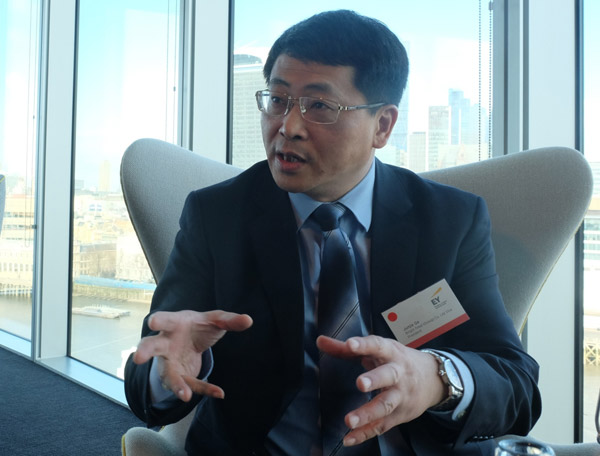Bright Food continues with overseas expansion
Updated: 2015-03-06 00:47
By Cecily Liu(chinadaily.com.cn)
|
|||||||||||
 |
|
Ge Junjie, Vice President of Bright Food [Photo by Cecily Liu / China Daily] |
Bright Food will continue to pursue an internationalization strategy through acquisitions with a focus on Europe, says Ge Junjie, Vice President of Bright Food.
This strategy will allow Shanghai-headquartered Chinese food company to bringing top quality food products, management methods and quality assurance expertise from foreign markets to the vast Chinese consumer market, Ge says.
"This creates a win win situation, as China's food market has enormous demand, and we at Bright Food have great sales and distribution channels that can make Western food available to the Chinese consumer in a very efficient way," he says.
Ge was speaking at this year's LSE SU China Development Forum in February, which is organized by the China Development Society of London School of Economic and Political Science's student union, in collaboration with EY and LSE's Asia Research Center.
In recent years, Bright Food has participated in several high profile acquisition deals. Last year, Bright Food acquired a majority stake in Salov Group, an Italian olive oil maker.
In 2012, it bought a 60 percent stake in British cereal maker Weetabix Ltd. Weetabix's advanced technology systems proved attractive to Bright Food, the company said at the time.
The Weetabix brand has been manufactured and sold in the UK since 1932. Today it is the UK's number one selling, most trusted and most recommended cereal and is one of Britain's most iconic brands.
In the same year, Shanghai Sugar Cigarette and Wine, a subsidiary of Bright Food, the state-owned food group, has acquired 70 per cent of Diva Bordeaux, a French wine exporter.
In 2011, Bright Food bought a 75 percent stake in Australian food producer and importer Manassen Foods.
Bright Food's subsidiary Bright Dairy acquired a 51 percent stake in New Zealand dairy firm Synlait Milk Ltd in 2010 to introduce a new product to Chinese consumers under its own brand name.
The two parties worked together to develop Pure Canterbury, a premium infant formula brand for the Chinese market, which reached the shelves of Chinese supermarkets in 2011.
Ge says Bright Food places particular emphasis on the European and Australasian markets for acquisitions, as these markets have stable markets and rule of law, creating certainty when doing business. They also have companies with great management expertise that can be learnt by Bright Food to apply to the Chinese market, he says.
In selecting acquisition targets, Ge says his team greatly values firms that have products suitable for China's market, as well as long standing recognized brands that have a sustainable reputation.
In addition, the target companies need to have a very strong team of professional managers, whom Bright Food will keep to run the overseas expansion, and leverage their expertise for its international expansion.
"We really value overseas talents, especially those who are passionate about the China opportunity they now have access to as a result of cooperating with Bright Food," he says.
The companies Bright Food buy would also need to be profitable, sustainable and be generating a large amount cash flow already, Ge says.
Looking at China's food market in general, he says this market represents great opportunities because costs for food in China are currently high and there are not many good quality food products, but the demand for food is enormous.
Against all this background full of opportunities, Ge says Bright Food is well positioned to bring quality food to China, which will contribute towards the country's strategic shift from export driven growth to consumption led growth.
"After we acquire overseas firms, we help them to make significant strategic changes, so that they are well positioned to take advantages of China's tremendous market opportunities. As well, some of their products would also require minor adjustments to suit Chinese consumers' tastes," he says.
In going global, Chinese companies like Bright Food also need to exercise tremendous soft power, global vision and global strategy.
"We also need to recognize and accommodate the different ways firms do business in different markets, so we accept and welcome different cultures that exist at our overseas subsidiaries," he says.
Related Stories
Chairman of China's Bright Food on trial for corruption 2014-12-13 10:36
Bright Food eyes on e-commerce approach for fresh food 2014-11-21 14:52
China's Bright Food acquires majority stake in Salov 2014-10-08 08:04
Bright Food sees bright M&A options 2014-06-26 13:52
Today's Top News
Bright Food continues with overseas expansion
China lowers annual GDP growth target to 7%
China faces 'formidable challenges'
Diplomats talk about 'two sessions'
US ambassador to S.Korea attacked
Belgian royal couple to visit China
China faces 'formidable challenges', says Li
China's defense budget to rise about 10%
Hot Topics
Lunar probe , China growth forecasts, Emission rules get tougher, China seen through 'colored lens', International board,
Editor's Picks

|

|

|

|

|

|





